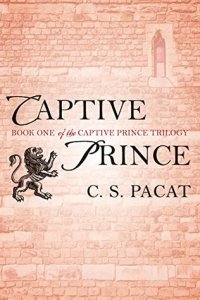 Author: C.S. Pacat
Author: C.S. Pacat
Publisher: Penguin
Rating: 3.5 stars
Type: Novel in a Series
Purchased by Reviewer
Blurb: Damen is a warrior hero to his people, and the rightful heir to the throne of Akielos, but when his half brother seizes power, Damen is captured, stripped of his identity, and sent to serve the prince of an enemy nation as a pleasure slave.
Beautiful, manipulative and deadly, his new master Prince Laurent epitomizes the worst of the court at Vere. But in the lethal political web of the Veretian court, nothing is as it seems, and when Damen finds himself caught up in a play for the throne, he must work together with Laurent to survive and save his country.
For Damen, there is just one rule: never, ever reveal his true identity. Because the one man Damen needs is the one man who has more reason to hate him than anyone else . . .
Review: Damen thought he knew his brother Kastor. Then Kastor enslaved him and gave him to their enemy. Damen, being the rightful heir to the throne of Akielos, was in Kastor’s way. Now, Damen is the property of the Crown Prince of Vere, Laurent. Laurent appears to be everything Damen is not, they are even opposite physically. Luckily for Damen, Laurent is unaware his new slave is the rightful heir to the Akielon throne, as Laurent has a vicious hatred for Damianos. Damianos killed Laurent’s older brother Auguste, the Veretians then lost the war. So, Laurent has issues. Damen doesn’t understand them. Damen can’t figure out how Laurent works. Damen is disgusted with Veretian court life and politics. No one’s motives are apparent, everything is plans within plans. Laurent and his Uncle, the Regent, are constantly trying to outmaneuver each other. Damen just wants to get back to Akielos. The gossip he hears about the goings on there is not very good. Coupled with the things he learns in the Veretian court, Damen has finally begun to understand his only hope of saving Akielos and its people lie in saving Laurent.
This story is fascinating, and I want to know more. The writing? Yeah, that’s not so good. Personally, I just wasn’t a huge fan of the tone of the prose. At times it felt a bit pompous, to me. Occasionally phrases or word choices would make me laugh aloud. Not in the good way. Objectively, some of this is just flat out a disaster. There were sentences with no main verb, just all modals and clauses. Penguin’s name is on this. There are missing words, and once or twice I found myself channeling Inigo Montoya and thinking, “I do not think that means what you think it means.”
And now after all that complaining about the quality of the writing I’m going to tell you I think you should read this book because the story is compelling. Damen is well and truly trapped in this situation, and has to become the same type of devious thinker as his half-brother Kastor and his owner Laurent. This is a really important thing. Mark well and remember. We know comparatively little about Laurent. We know he hates his Uncle. We know he hates Damianos for killing his brother. We know Laurent is setting himself up as the opposite of almost everything that happens at the Veretian court, all while being aloof and rather cold. Even Laurent’s own men have mixed feelings toward him. They respect him yet don’t understand his motivations at all. I have a hypothesis about Laurent. If I’m right it’s going to open a giant can of worms for Damen.
This compelling character drama is taking place in a backdrop that’s… kind of mediocre. Vere is pretty much France. The overwhelming majority of the book takes place in Vere, what little we see of Akielos makes it look a bit like Greece. In terms of world building, Vere and Akielos are barely described. What are their trade goods? No clue. What are the religious differences? No clue. There seems to be no religion at all in the stories. These are pre-industrial societies with no apparent religion. Vere and Akielos are fighting over land and the reader knows nothing about why. Is it especially fertile or resource rich? Is there great cultural significance for either country? None of this is explained.
I am a firm believer story trumps craft. I want to know about Damen and Laurent’s stories. I’m willing to read half formed societies and half formed sentences to find out what happens.

